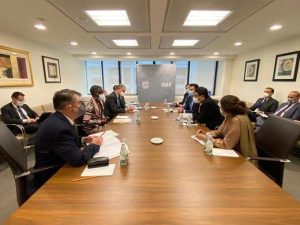Niha Dagia

There is a meme on the internet showing three children playing a videogame but only two have their controller cords plugged into the console. The third child, who appears to be the youngest, is being deceived into believing he has stakes in the game.
Pakistan’s social media perceives the youngest child to be the country’s incumbent Finance Minister Miftah Ismail.
Despite repeatedly asserting that fuel subsidies are unfeasible, Ismail announced on Sunday that due to changing circumstances and international oil prices, the Shehbaz Sharif government “may have to revisit…soon” its decision to not increase the price of petrol.
That “soon” would have to come sooner than later as the clock ticks on Pakistan’s economic bailout. Islamabad is already lagging on its commitments to the International Monetary Fund (IMF). Among the conditions set by the IMF for loan resumption is the removal of the fuel subsidy that is costing the country 2.5 billion Indian rupees ($12 million) a day.
The subsidy threatens to take Pakistan toward a default if an agreement is not reached with the IMF. Bilateral donors and friendly countries including China and the Gulf states have also linked their financial support to negotiations with the IMF.
The country’s trade deficit has spiked to $39.3 billion, about $11 billion more than the estimate for the fiscal year 2021-2022. The foreign reserves have also decreased to $10.5 billion – not enough to cover two months of imports.
Although the new finance minister has insisted on taking tough but necessary decisions to fix the economy, his recommendations have been shelved by the premier and the ruling party’s economic guru Ishaq Dar – a former finance minister whose son is married to the PML-N supremo Nawaz Sharif’s daughter.
As opposed to IMF “dictation,” Dar wants a new deal with softer conditions.
Ironically, the coalition had been critical of the previous government’s decision to freeze petrol and power prices for four months (February 28 – June 30) and accused former Prime Minister Imran Khan of derailing the IMF program for political reasons.
Even so, it is comical to see former ministers condemn the new coalition government for not doing away with the economic policies they crafted when in power. Through misgovernance, corruption, and incompetence, Khan laid out a web of landmines for his successors to tiptoe around.
The new government is aware that removing subsidies during rising inflation will be an unpopular decision that inflicts more pain on the common man. Yet, it appears unprepared to take on the economic challenge it fought so diligently to take on.
Any further delay in decision-making on economic measures due to a fear of political backlash would mean increasing borrowing from banks as foreign loans dry up, boosting fiscal deficit, and raising interest rates. The trade-off would delay the revival of the IMF program and constrain Islamabad’s ability to secure loans from multilateral and bilateral lenders.
In hindsight, the coalition has blessed Khan with a political lifeline as he skillfully shifts blame for economic woes to the incumbent government.
The writing on the wall is clear. Whoever takes the tough economic decisions will bear the burnt in the next general elections.
From here, the ruling Pakistan Muslim League-Nawaz could either prioritize the country over politics and set the house in order – however unpopular those decisions may be – or dissolve the National Assembly, call for fresh elections, and leave it to the interim government to deal with the fallout.
No comments:
Post a Comment